|
|
|
Sort Order |
|
|
|
Items / Page
|
|
|
|
|
|
|
| Srl | Item |
| 1 |
ID:
129944
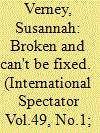

|
|
|
|
|
| Publication |
2014.
|
| Summary/Abstract |
The Greek election of May 2012 failed to produce a government, resulting in repeat elections six weeks later. This shock outcome was a symptom of a broader delegitimation of the national political system. Over the past decade Eurobarometer data show a much more extensive loss of confidence in political institutions in Greece than in the European Union as a whole. In a first phase, rising political discontent was managed within the traditional political framework through alternation in power between the two major parties. In contrast, the second phase, following the outbreak of the Greek sovereign debt crisis, led to the dramatic fragmentation of the party system and changed the mode of government formation. This process is not reversible and entails serious democratic dangers.
|
|
|
|
|
|
|
|
|
|
|
|
|
|
|
|
| 2 |
ID:
139809
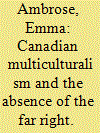

|
|
|
|
|
| Summary/Abstract |
The far right has never been a prominent force in Canadian politics or society. Traditionally, they more resembled the North American than the West European model: ideologically dominated by right-wing populism and white supremacy, organizationally characterized by factionalism and sectarianism. The extreme right seems an almost negligible force today, in part reflecting a similar decline in the United States, while the radical right has so far been unable to build upon the recent upsurge of Islamophobia, as in Western Europe. We argue that the failure of the Canadian radical right is primarily the result of Canada's unique multiculturalism policy, which is based on a combination of selective immigration, comprehensive integration, and strong state repression of dissent on these policies. This unique blend of policies has led to a relatively low level of opposition to multiculturalism and has left little legal and political space for far right politics.
|
|
|
|
|
|
|
|
|
|
|
|
|
|
|
|
| 3 |
ID:
185750
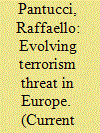

|
|
|
|
|
| Summary/Abstract |
The threat of mass-casualty terrorist attacks in Europe directed by international organizations may have subsided, but the threat is in many respects now more menacing that ever. Lone-actor attacks motivated by a confused mixture of ideologies, often combined with mental health issues, are increasingly the norm, and are harder to detect and prevent. A rising extreme right, meanwhile, is increasingly mirroring violent Islamist groups. In these varied forms, terrorism continues to strike at the heart of European identity and liberal ideals, playing out against a backdrop of anti-immigrant sentiment and high levels of political polarization.
|
|
|
|
|
|
|
|
|
|
|
|
|
|
|
|
| 4 |
ID:
188085
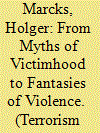

|
|
|
|
|
| Summary/Abstract |
Why is far-right rhetoric so dangerous? In recent years, scholars and policy makers alike have striven to unpack the black box of extremists’ online communication and the rise of far-right violence. Particularly the role of social media in spreading hate speech and fostering radicalization has caught a lot of attention; however, there has been little success in pinning down the drivers of violence. Drawing on the concept of dangerous speech, we take a step back from the violent effects of far-right online communication. Instead, we examine its logical functioning to illuminate the upstream processes that constitute hate and legitimize violence. More concretely, we study how far-right narratives employed on social media mobilize emotions that prepare for the acceptance or even use of violence. Analyzing the argumentative structures of two anti-immigration campaigns in Germany, we find a network of narratives where narratives of imperilment— supported by narratives of conspiracy and inequality—converge into a greater story of national threat and awakening. By constructing a situation of collective self-defense, violence becomes a logical option, even if violent action is not explicitly proposed. Counter-narrative efforts should thus not only focus on hate speech but also address the myths of victimhood, which are constitutive of (violent) palingenetic fantasies.
|
|
|
|
|
|
|
|
|
|
|
|
|
|
|
|
| 5 |
ID:
192013
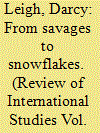

|
|
|
|
|
| Summary/Abstract |
Right-wing free speech advocacy is increasingly shaping global politics. In IR, free speech has generally been viewed within human rights and international legal frameworks. However, this article shows that contemporary free speech advocates often ignore or oppose human rights and international law, focusing instead on (what they describe as) a defence of the nation state against the enemies of free speech. This article examines this articulation of free speech's enemies: first historically as the ‘savage’ in John Stuart Mill's influential formulation of free speech; and then contemporarily as the ‘snowflake’, ‘mob’, and ‘cultural Marxist’ by elected officials and lobbyists in the UK and US. The article argues that John Stuart Mill's savage is figured within a racialised civilisational hierarchy of degrees of humanity. Today, right-wing free speech advocates extend and reconfigure this hierarchy, imagining the ‘snowflake’, ‘mob’, and ‘cultural Marxist’ as lesser human, subhuman, and extra-human, respectively. Thus, in contrast to rights-based analyses of free speech advocacy – which assume or assess the promotion of rights as a ‘public good’ – the article argues that narratives of free speech's enemies are deployed by right-wing free speech advocates to underwrite racialised policy responses and global hierarchies.
|
|
|
|
|
|
|
|
|
|
|
|
|
|
|
|
| 6 |
ID:
156903
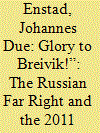

|
|
|
|
|
| Summary/Abstract |
This article documents Anders Behring Breivik's reception on the Russian far Right, with a comparative view to Western Europe. On July 22, 2011, Breivik carried out two terrorist attacks in Norway, killing 77 people. Based on a variety of open sources, the article finds that Breivik has received much more open support in Russia than in Western Europe. I suggest there are three main reasons why Russia stands out. First, a weaker social stigma attached to Right-Wing extremism reduces the cost of publicly embracing Right-Wing terrorists. Second, higher levels of violence in Russian society increase desensitization and violence acceptance. Third, the embrace of Breivik fits into a vibrant tradition of iconizing Right-Wing militants on the Russian far Right. The article highlights Russia as a hotspot of Right-Wing extremist activism in Europe. It also provides insights that may prove useful in future comparative research on cross-national variation in Right-Wing violence and terrorism.
|
|
|
|
|
|
|
|
|
|
|
|
|
|
|
|
| 7 |
ID:
191068
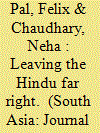

|
|
|
|
|
| Summary/Abstract |
Why do people leave the world’s largest far-right organisation? In this article, we analyse six autobiographical defection accounts of ex-members of the Rashtriya Swayamsevak Sangh (RSS), the apex organisation of the Indian Hindu nationalist movement. Compiled here for the first time, an analysis of these accounts reveals that even the most disciplined and ideologically coherent far-right organisations suffer from internal organisational messiness and attrition. These accounts challenge the unique mythology that surrounds the RSS and gesture towards the methodological possibilities of discarding the ideology-driven analyses of the far right in favour of material analyses of the lives of far-right organisational members.
|
|
|
|
|
|
|
|
|
|
|
|
|
|
|
|
| 8 |
ID:
137545
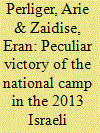

|
|
|
|
|
| Summary/Abstract |
This article argues that attempts to characterize the outcome of the elections to the 19th Knesset as a defeat of the Israeli right are misleading. By using a three-dimensional analysis of the ideological makeup of the Knesset, based on the ideological manifestos of the parties, the socio-demographic profiles of Knesset members and analyses of election results utilizing electoral data and socio-demographic data obtained from Israel's Central Bureau of Statistics (CBS), the article claims that the 19th Knesset is no less right-leaning than its predecessor. Hence, contrary to some commentators in both the media and academia, the 2013 elections represent a true landmark for the settlers. For the first time since the movement appeared in the 1970s, it managed to obtain a solid base in the Knesset.
|
|
|
|
|
|
|
|
|
|
|
|
|
|
|
|
| 9 |
ID:
184065


|
|
|
|
|
| Summary/Abstract |
This article explores an intriguing emergent organising strategy among women of colour activists in London and Amsterdam: a politics of refusal. In response to the triple catastrophes facing women of colour: the on-going roll back of social welfare states, the normalisation of the far right in everyday life and the xenophobic backlash against migrants, we find that some women of colour activists are deliberatively withdrawing from view and working outside of dominant left activist spaces. Rather than demanding recognition and rights from institutional actors and supposed allies, many activists appeared to welcome and embrace their marginalisation as this exclusion from mainstream life creates the possiblity for alternative ways of doing politics and being political. Drawing on the work of Audra Simpson, we attempt to map the contours of women of colour’s refusal politics and consider how refusal generates different approaches to sovergenity and ungovernability.
|
|
|
|
|
|
|
|
|
|
|
|
|
|
|
|
| 10 |
ID:
174036
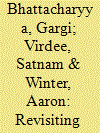

|
|
|
|
|
| Summary/Abstract |
This piece reconsiders histories of anti-racist thought and practice, including the linkages between anti-racisms and other traditions of liberatory thought. We argue that anti-racism should be understood as a strand in radical thought linking internationalism, institutional critique and street activism, in the process interfeeding with other social movements. The traditions of anti-racist thought discussed in this special issue exemplify these cross-cutting influences.
|
|
|
|
|
|
|
|
|
|
|
|
|
|
|
|
| 11 |
ID:
153228
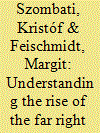

|
|
|
|
|
| Summary/Abstract |
This paper analyses the reconfiguration of social relations in rural Hungary after the collapse of socialism as well as the cultural idioms in which these changes were interpreted in order to unearth the connection between structural transformation, the re-articulation of ethnic and peasant traditions and the discourse on Roma as a threat to communal harmony. The locality in the focus of our case study is a village that played a major role in the rise of the far-right Jobbik party. By applying an ethnographic approach, we seek to uncover structural forces, discourses and agencies that help explain the success of the anti-Roma mobilization campaign that ended with Jobbik’s electoral victory.
|
|
|
|
|
|
|
|
|
|
|
|
|
|
|
|
| 12 |
ID:
182998
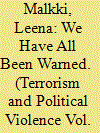

|
|
|
|
|
| Summary/Abstract |
The Capitol attack has provoked intensive debate and reflection far beyond the United States. These debates and their repercussions will be part of the legacy of the event. The article looks at the public debate on the Capitol attack in Finland and Sweden. In both countries, the Capitol attack was interpreted as a warning about the powerful consequences of sowing distrust towards democracy. The attack may inspire far-right actors to attempt to shake the democratic system in these countries too. Whether such mobilisation could succeed and gain support from within the political system seems unlikely, but not entirely impossible.
|
|
|
|
|
|
|
|
|
|
|
|
|
|
|
|
| 13 |
ID:
176985
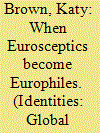

|
|
|
|
|
| Summary/Abstract |
Turkey’s involvement in the European Union has long provoked controversy among Europe’s elites. Recently, in the context of the so-called ‘migrant crisis’, coupled with the mainstreaming of Islamophobia and rising Euroscepticism, the issue of Turkey has acquired renewed significance. While many scholars have linked hostility towards Turkey with the desired construction of a supra-national European identity, few have noted the role it plays in the discourse of parties that explicitly reject the EU. Adopting a mixed-methods approach to Critical Discourse Studies, this paper investigates the contemporary construction of Turkey as a dangerous ‘other’ by far-right parties in the United Kingdom (UKIP) and France (FN/RN). Drawing on theories of Orientalism, Islamophobia and civilisationism, it exposes the apparent contradiction in the strongly Eurosceptic positions adopted by these parties, while simultaneously rejecting Turkish involvement based on its supposed ‘non-Europeanness’. They thus become defenders of Europe while simultaneously undermining the supra-national EU project.
|
|
|
|
|
|
|
|
|
|
|
|
|
|
|
|
| 14 |
ID:
105066


|
|
|
|
|
|
|
|